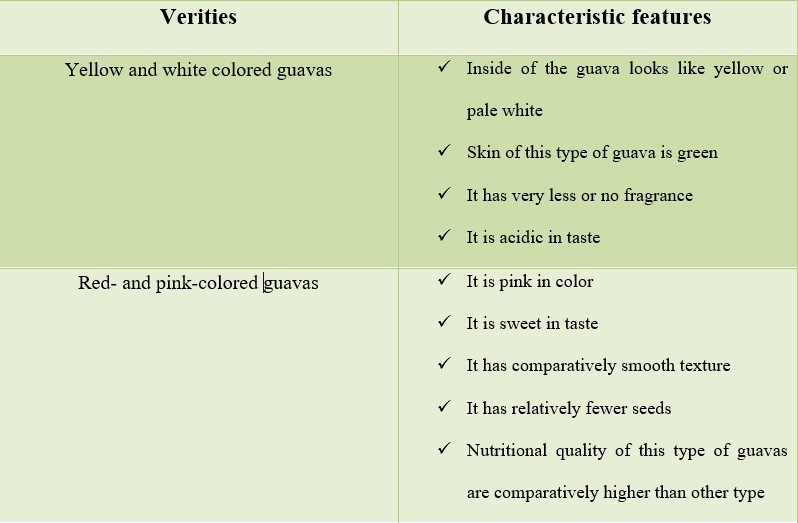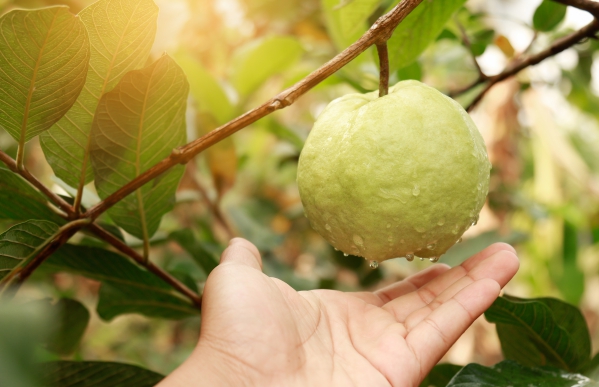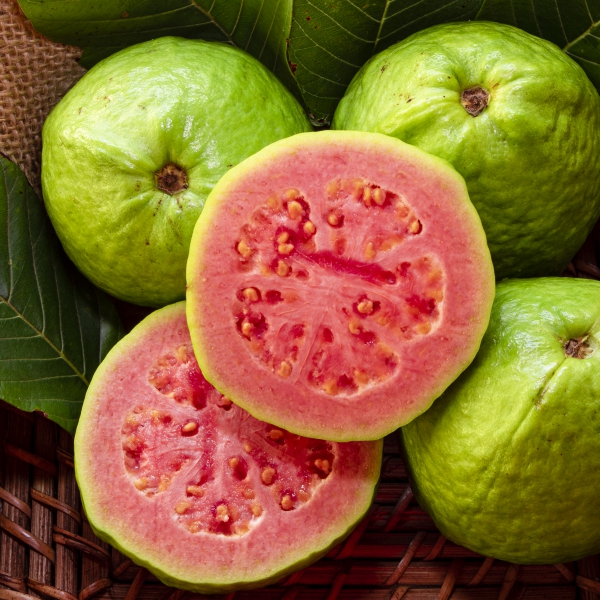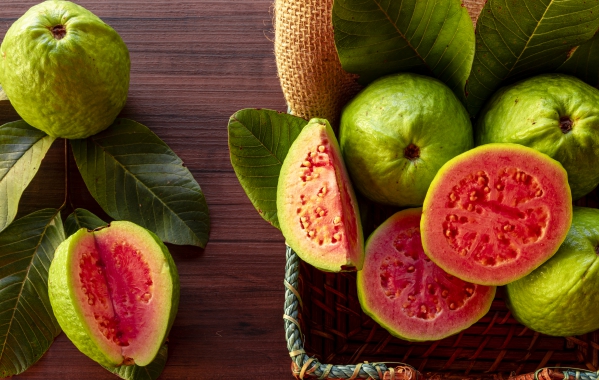Guava is an antioxidant rich fruit with great health importance. It has been traditionally used for treating various degenerative diseases.
Nutritional overview
- It contains fewer amounts of carbohydrates, but it is significantly rich in fibre
- It contains negligible amount of protein
- It contains very trace amount of fat and totally free from cholesterol
- It contains several vitamins like Vitamin A, vitamin C, Vitamin E, Vitamin K, Vitamin B1, B2, B3, B5, B6, B9 and choline
- The most important fact is that guava contains four times more Vitamin C than oranges (which is considered as one of the richest sources of Vitamin C)
- It contains several trace elements also, which include calcium, phosphorus, potassium, iron, copper, zinc, selenium and manganese
Type of guava
Guava exists in different forms in nature and all the types are equally nutritious, but they differ in some characteristics. Below table will show an overview of different types of guava –

Significance of guava leaves
- Along with guava an individual can consume guava leaves as well because it also has numerous health benefits
- It is widely used as an efficient antidiarrheal agent
- It is also very beneficial for improving oral health. Rubbing of guava leaves on gum helps to reduce the prevalence of various gum disorders
- It also helps to reduce hypercholesterolemia

Health benefits
Role on immunity
- Vitamin C content of guava is responsible for enhancing immunity
- It helps to enhance the disease fighting ability of body
- It also helps to protect the body from invading pathogens and infectious agent
Role on digestive health
- Guava contains comparatively higher fibre than other fruit and its consumption is very effective for improving digestion
- Its fibre content helps to improve the softness and mass of stool that helps in smooth defecation thus prevents constipation
- It also helps to improve bowel movement
- It is associated with improving peristalsis and promotes colonic health as well
- Its antispasmodic effect helps to reduce stomachache
- Its antimicrobial activities are also accountable for inhibiting diarrhea
Role on weight management
- Consumption of guava is very effective as it facilitates weight reduction
- Guava contains significant amount of fibre that helps to increase the catabolic rate of body and also decreases fat accumulation, which promotes weight loss
 It also provides a feeling of satiety that helps to reduce food consumption that affects energy balance
It also provides a feeling of satiety that helps to reduce food consumption that affects energy balance- Consumption of guava is comparatively better (for obese person) than consuming other fruit as it contains relatively less amount of carbohydrate hence contributes less energy
Role on maternal health
- Consumption of guava is very beneficial during pregnancy as it contains significant amount of folic acid
- It helps to support maternal growth
- Its consumption is extremely helpful for promoting the development of nervous system of fetus
- It also helps to reduce the risk of developing neurological disorders as well as birth defects
Role on eye health
- Vitamin A component of guava plays imperative role for improving eye health
- It helps to improve vision as well
- It also helps to decrease the susceptibility of developing macular degeneration and cataract
Role on nervous system
- Consumption of guava is incredibly helpful for enhancing the growth and development of nervous system
- It helps to increases blood circulation to brain, which is closely related with enhancing the supply of oxygen and nutrients to the brain that provides proper nourishment and promotes its function
- It also helps to protect nerve cells from oxidative damages
- It is significantly rich in Vitamin B3 and Vitamin B6, which help to improve cognitive functions
- It also helps to reduce the prevalence of dementia

Role on mental health
- It plays significant role in reducing the stress level of the body
- It also helps to prevent depression as well as anxiety
- Magnesium is one of the most important trace elements found in guava, responsible for relaxing nerve as well as muscle hence its consumption is very helpful for combating nervous tension
- It also helps to improve mental functioning as it contains significant amount of potassium, which is associated with maintaining the electrical conductivity of brain
Role on oral health
- It has seen that consumption of guava is very helpful for improving oral health
- Guava has strong anti-inflammatory activity that helps to prevent swelling and pain. Hence its consumption is very effective for reducing toothache. Guava leaves also exert same effects hence guava leaves can also be used as an effective remedial action for toothache
- Its antimicrobial activities are accountable for killing germs and also help to fight against infections thus its consumption is very effective for decreasing the prevalence of oral infection as it inhibits microbial infestation within oral cavities
- Consumption of guava significantly reduces the prevalence of oral ulcer and swollen gum
- It is also extensively used as an effective preventive measure for periodontal disease

Role on skin
- It helps to promote skin health
- Its antioxidant activities are responsible for protecting the skin from oxidative damages
- It also helps to protect the skin from the harmful effects of UV radiation
- Vitamin A and Vitamin C components of guava play significant role for enhancing skin firmness
- It also helps to improve the complexion
- It helps to prevent ageing as well
- It also reduces the prevalence of wrinkles and acne
Therapeutic advantages
- It is extensively used for reducing blood cholesterol levels. It has seen that its fibre content plays significant role in reducing the concentration of LDL, VLDL and triglyceride within body
- It also helps to improve cardiac health as its cholesterol lowering effect is associated with reducing the prevalence of atherosclerosis hence decreases the risk of developing coronary artery diseases
- Its potassium content is very helpful for decreasing blood pressure
- Its fibre content is also accountable for reducing blood sugar concentration as fibre helps to reduce glucose absorption from intestinal epithelial cells hence decreases the load of glucose in blood stream. Thus, its consumption is very effective for decreasing the susceptibility of developing diabetes mellitus
- Guava leaves also exerts anti-hyperglycemic activities
- Its Vitamin C content helps to prevent normal cold and coughs
- Consumption of guava is extremely effective for clearing mucous and disinfecting throat, lungs as well as respiratory tract
- It helps to prevent premenstrual syndrome as well hence its consumption is very effective for those women who have dysmenorrhea

Risk factors
- As it contains significant amount of fibre hence its over consumption may cause several digestive disorders and flatulence
- Over consumption of guava is very harmful for diabetic patient as it increases the risk of hypoglycemia

Source:
Blancas‐Benitez, F.J., González‐Aguilar, G.A. and Sáyago‐Ayerdi, S.G., 2017. Guava (Psidium guajava). Fruit and Vegetable Phytochemicals: Chemistry and Human Health, 2nd Edition, pp.1067-1076.
Kafle, A., Mohapatra, S.S., Reddy, I. and Chapagain, M., 2018. A review on medicinal properties of Psidium guajava. Journal of Medicinal Plants, 6(4), pp.44-47.
Naseer, S., Hussain, S., Naeem, N., Pervaiz, M. and Rahman, M., 2018. The phytochemistry and medicinal value of Psidium guajava (guava). Clinical Phytoscience, 4(1), pp.1-8.
Parvez, G.M., Shakib, U., Khokon, M.A. and Sanzia, M., 2018. A short review on a nutritional fruit: guava. Opn Acc Tox & Res, 1(1), pp.1-8.
Thakur, N., Upadhyay, S. and Samant, P., MEDICINAL AND TRADITIONAL PROPERTIES OF PSIDIUM GUAJAVA: A REVIEW.
Upadhyay, R., Dass, J.F.P., Chauhan, A.K., Yadav, P., Singh, M. and Singh, R.B., 2019. Guava Enriched Functional Foods: Therapeutic Potentials and Technological Challenges. In The Role of Functional Food Security in Global Health (pp. 365-378). Academic Press.
Vijaya Anand, A., Velayuthaprabhu, S., Rengarajan, R.L., Sampathkumar, P. and Radhakrishnan, R., 2020. Bioactive Compounds of Guava (Psidium guajava L.). Bioactive Compounds in Underutilized Fruits and Nuts, pp.503-527.



